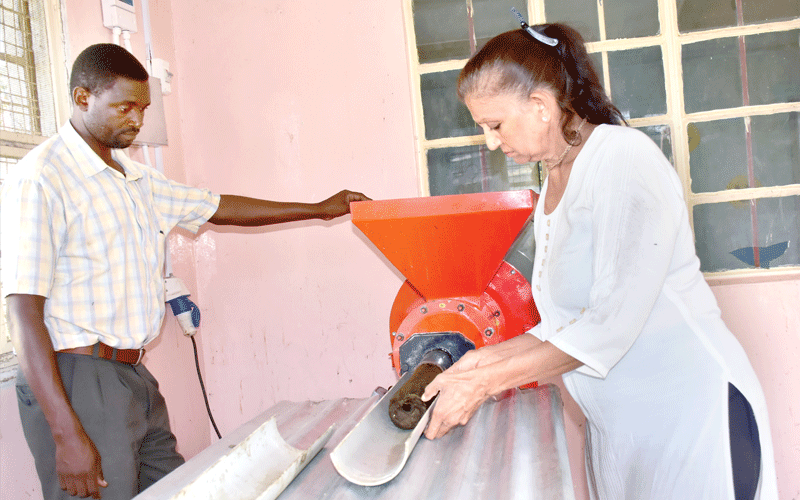Dunga residents use cow dung to save forests

Kalpana Karia is rewriting the history of a community in Kisumu town by promoting environmental conversation with eco-friendly fuel.
After watching the wanton destruction of trees for firewood around Kisumu county, Kalpana Karia decided to do something about it.
She set up an initiative christened ‘Gopi Ng’ombe’, a value-addition project to introduce residents to alternative cheap clean energy sources.
Karia produces briquettes from cow dung.
“The idea is to encourage locals to adopt briquettes as an alternative energy for domestic purposes.
Through this we will help save several trees cut down to produce fossil fuels,” she explains.
The philanthropist says her objective is to see local communities fully integrated in environmental protection agenda by embracing clean energy use.
The venture has started bearing fruit as residents learn the importance of using the briquettes.
Cost effective
Production starts with collection of dung. Pure cow dung is used, but it is, sometimes, mixed with dried grass.
The dung is fed into a machine to dry it. The dried product is then processed in the hammer mill, which grinds it before it is placed in the briquette presser to convert it into pellets.
To start the project, Karia invested Sh100,000, which was used to purchase three cows and the briquettes processing machine. 
“We are promoting use of clean energy among local communities because apart from aiding environmental conservation, it also advances healthy living,” she says.
In a day, the venture, located at Dunga area on the outskirts of Kisumu town, can produce as many as 35 briquettes an hour. This alternative fuel is cost effective in the long run.
Not only is it easy to produce, it also burns slower but with high heat, for example, with just two briquettes, one can cook for four hours.
Users eventually save money by spending less on briquettes over a long duration.
“People spend much on charcoal and other non-renewable energy forms. This project not only saves the environment, but also increases money for domestic use,” she explains.
The project has also reduced poverty as residents get income by supplying cow dung. Currently, a number of livestock farmers deliver at least 10 wheelbarrows full of cow dung a day.
Each wheelbarrow produces 30 briquettes. Previously, the firm used to buy small quantity of the commodity when it started production a year ago. Farmers earn Sh 300 for every delivery.
“Apart from the milk they get from the cows, there is also added lifetime income that comes from selling the dung for use in our project,” states Karia.
One of the farmers, Mary Oketch, says her fortunes have changed as a result of more income flow from cow dung sale.
“My cows barely produced enough milk, which means I was making very little money from selling milk alone.
But the story has changed because of the benefits I get from this briquettes business,” explains Oketch.
Another farmer, Michael Odero, says withan assured market for the cow dung, he has added more dairy cows on his farm to tap extra income.
“This is a God-sent opportunity to us. We didn’t know one could sell such waste and make money from it,” Odero says.
School adoption
Although the project is not a profit making enterprise, Karia says there is little income that comes from it.
In a month, she sells between 100 and 150 boxes of briquettes, but hopes to sell more in future.
A small box, containing 15 pellets, costs Sh200, and bigger one, with between 70 and 100 pieces, sells at Sh800.
Karia points out inadequate awareness in the community on the use of briquettes as a main challenge the project experiences.
“People don’t understand the principle behind the clean energy innovations. It was absolutely difficult to make residents buy the concept at the beginning,” she recalls.
Karia’s prayer is that the county government enhances awareness to the residents on use of clean energy initiatives to help save the environment.
“If every household can use briquettes, they will help save a million of trees that are cut mainly for charcoal,” she notes.
Kisumu Water and Environment executive Salmon Orimba says such interventions are welcomed as they seek to save the surroundings and positively impact on the livelihood.
Orimba says the county government is keen on promoting initiatives of such kind with a view of reducing consumption of wood fuel and charcoal.
He says the county is encouraging residents to embrace use of alternative source of fuel to help in conserving the environment.
“We want to market such projects to enable them realise their objective in environmental conservation plan,” says Orimba.
Briquettes are considered a renewable and clean energy source.
Karia, in the endeavours to scale up production, is trying to reach institutions such as schools with plans to start selling them briquettes.
“Schools should embrace the concept of using clean energy to save the environment and money.
Our plan is sto tart teaching the learning centres use of briquettes for cooking,” Karia concludes.



